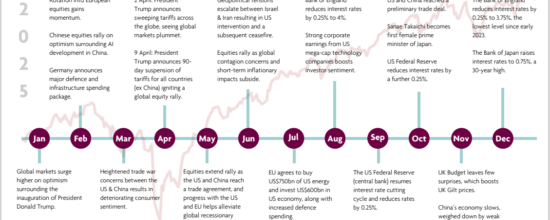Market Update: Inflation begins to cool as rates continue to rise
Central banks continued to increase interest rates although there were encouraging signs that inflation may have reached its peak.
US markets rebounded when the Federal Reserve (Fed) hinted that it may not have to increase interest rates in 2023 by as much as expected. However, they fell back after employment numbers were released, which show the jobs market remains strong. A strong jobs market could mean a more resilient economy, which could keep inflation elevated.
The US central bank raised its benchmark interest rate by half a percentage point, taking it to a target range of 4.25% to 4.5%. The half-point increase follows four consecutive rises of three-quarters of a percentage point at its previous meetings.
November’s inflation figure helped steer the Fed’s decision. The annual inflation rate, as measured by consumer prices, dropped to 7.1% from 7.7% in October, the lowest it has been all year, but still well above the average of 2.1% in the three years before the Covid-19 pandemic.
In the UK, the Bank of England raised interest rates too in December, by half a percentage point to 3.5% – the highest level in 14 years. The bank warned that further rate rises in 2023 are likely.
Slowing growth and rising rates
There were ongoing concerns about an economic slowdown in the UK and the risks of falling into recession. Chancellor Jeremy Hunt said the economy is “likely to get worse before it gets better”. Figures released late in December confirmed these worries, showing the economy shrank faster than thought in the third quarter.
The pace of annual inflation in the UK dipped in November to 10.7%, another welcome figure and better than expected. Experts believe inflation has probably passed its peak, with the sharp price rises of the past year starting to recede. However, the cost-of-living crisis for UK households continued to bite, with high energy costs one of the largest contributors.
The European Central Bank raised borrowing costs by half a percentage point in December to 2% and warned of further rate rises to come. Like the US and UK, interest rates in Europe have not been this high since the aftermath of the 2008 Global Financial Crisis.
China dismantles its zero-Covid policy
China’s economic activity has been sluggish, with retail sales falling and a slowdown in industrial output, resulting in a larger-than-expected drop in imports and exports. Experts believe China’s economy weakened more than thought in the last quarter of 2022, following the cooling in the global economy and the country’s Covid lockdowns.
Consumer demand and production have been hit hard by the government’s zero-Covid policy, which started winding down in December – but resulted in a surge in infections and fatalities. In addition to uncertainty about how China will manage the pandemic, its financial markets remain vulnerable to political intervention.



